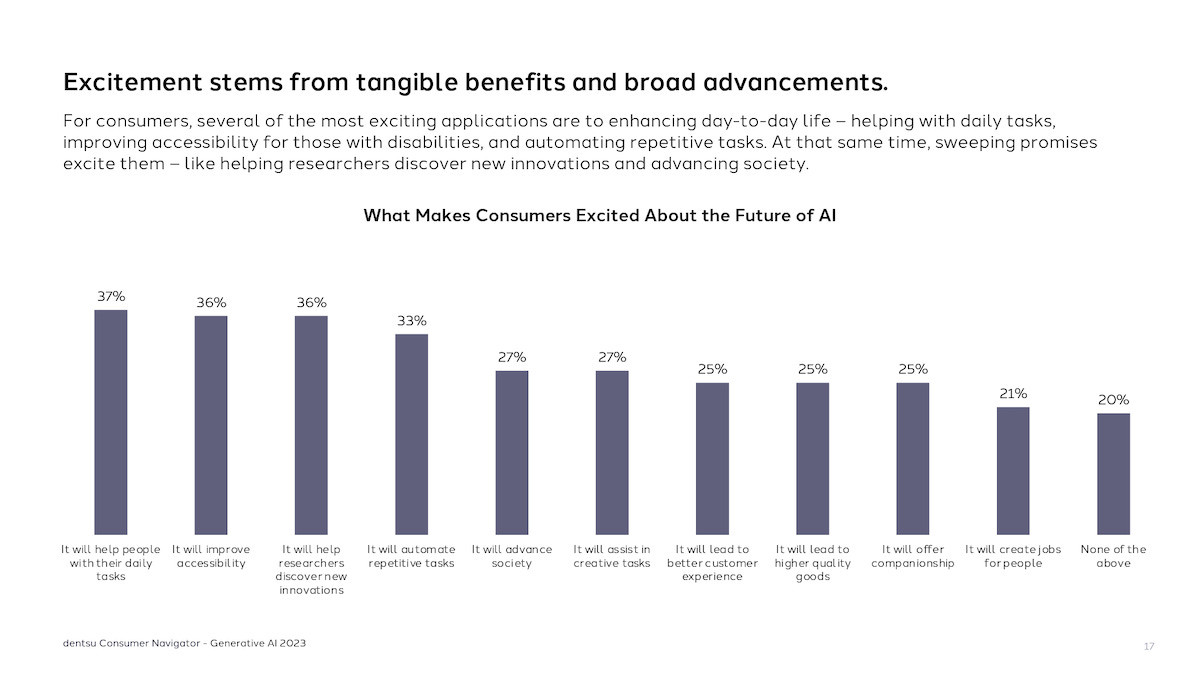New Report Says 27% of Online Adults Have Used Generative AI but Caveat Emptor
Consumers believe AI can make daily life better
Fifty-seven percent of U.S. adults believe “generative AI will make my daily life better,” according to a new report by Dentsu. The survey of 1,000 online adults in the United States also found that 87% of consumers claim to have some awareness of generative AI, and 61% believe they at least somewhat understand the technology.
Even more interesting is that 27% of U.S. adults say they have used generative AI, and another 42% are interested in trying the technology. These tremendously positive numbers seem to support the hyperbolic interest in ChatGPT and text-to-image generators such as Midjourney and Stable Diffusion. But, there is more to this story.
Get Excited, but the Numbers are High
Don’t try to multiply these numbers by the U.S. adult population to calculate a total user base. It will overstate the results. This sample does not count offline adults, which will naturally knock off a few percentage points and bring this under 25%. In addition, the data is sourced from a recurring panel which generally will make it even less representative of the general populous. According to the report:
The survey garners an equal number of male and female respondents and controls for nationally representative weighting across race and ethnicity (using the latest publicly available U.S. Census numbers).
What is not mentioned is a survey sample weighting for income or education. This likely means the sample skews toward higher income and education than the average American.
I don’t bring this up to undermine the results or criticize the researchers. I want you to know these numbers are higher than what you should expect from a more balanced survey. The results represent a very optimistic adoption case. However, we are still looking at around one-in-five U.S. adults having used generative AI, which is extraordinary for such a young product category.
You will see every company founder in generative AI extolling these numbers, and something even more optimistic is sure to come out of Gartner at some point. This will overstate the adoption to date and in future periods with understate growth as the real numbers catch up. But that doesn’t mean the numbers are not useful. They do shed some important light on a rapidly growing market. So, let’s focus on what this tells us.
Millennial Men Are the Core Users
The report suggests that 41% of Millennials have tried at least one generative AI solution and that male users outpace females by fifteen percentage points. Women and Baby Boomers are the most skeptical, while Gen X and Gen Z show nearly identical results.
Why Consumers Are Interested in Generative AI
Consumers in the survey identified “help with daily tasks” and “automating repetitive tasks” as the first and fourth benefits engendering the most enthusiasm. “Improving accessibility” and “helping researchers discover new innovations” ranked second and third, respectively.
Generative AI Impact
Consumers expect the most positive impact to be in technology. Well behind this result, but still very positive, are use cases in entertainment, shopping, advertising, and healthcare. Much further down on the list is customer service.
This is a very interesting result. Customer service contact centers have already gained a lot of benefits from AI, and large language models may help drive even greater value. However, this doesn’t even occur to consumers. It will be challenging to employ generative AI in the contact center for many reasons. Still, it is unlikely that your everyday consumer could name even one, and certainly not two of these reasons.
Generative AI and Brands
There is also a lengthy report section on brands and generative AI. Overall, Dentsu found strongly favorable consumer views about the potential of AI to enable more personalization and improve products and user experiences.
These results suggest that brands do not have to worry much about some sort of widespread consumer backlash around the use of AI. This may materialize but the majority of the user base will see the move as favorable.
The biggest endorsement is once again likely to come from Millennial males. 55% of them said they were willing to pay more for products “designed with AI” and 60% prefer brands that use AI in product development and customer service. Boomers and women were, once again, the least likely to be impressed with a made-with-AI label or to pay more. However, the Boomer generation cohort was far less favorable than all women for these questions.
What it Means
The data sample skew notwithstanding, I think this is a very interesting report that offers interesting insights into the generative AI phenomenon. A link to the full report can be found in the first paragraph.
My takeaway is that consumer interest and adoption are positive and significant in scale. That is what the other data also show. So, you can look at the Dentsu numbers as confirmation of a trend. There is more to generative AI than the hype train.












